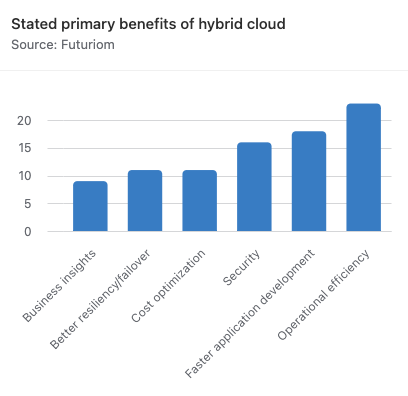Operational Efficiency Tops List of Cloud Benefits

There are many reasons why enterprises are shifting to a cloud environment – improved performance, streamlined application development, and better security, to name just a few. But our recent research on over 30 publicized cloud implementations shows that operational efficiency tops the list.
But just what is operational efficiency? We examined a range of descriptions of hybrid cloud environments to probe this question and came up with a multifaceted answer. It seems operational efficiency encompasses the benefits cited above, along with some others, as noted below:
Improved performance. As a rule, the less manual intervention a system requires, the faster it can run. When compute, storage, and networking are virtualized and controlled in a cloud environment, less on-premises equipment is required. This reduces the work of IT staff, freeing them to pursue system enhancements that can further improve performance. Operational benefits also extend into efficiencies that reduce capital expenditure (capex).
Example: When oil firm BP decided to shift nearly all its datacenter facilities to the cloud, “getting out of the datacenter management business” led to financial savings as well as improved uptime, thanks to the ability to spin up resources as needed. Here is how John Foster,head of global enablement at BP, stated it in a Microsoft case study:
“In the past, we might have needed a million dollars of capital to build a massive infrastructure before a project even started. With Azure, we can spin up a powerful virtual machine on demand and run applications for tens of dollars a day with no upfront procurement. Being able to do cutting-edge work quickly and without spending a lot of time on capital planning or bureaucracy has been really empowering.”

To access the rest of this article, you need a Futuriom CLOUD TRACKER PRO subscription — see below.
Access CLOUD TRACKER PRO
|
CLOUD TRACKER PRO Subscribers — Sign In |

















